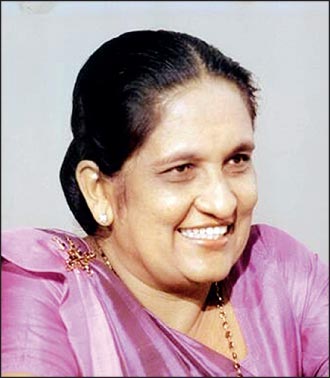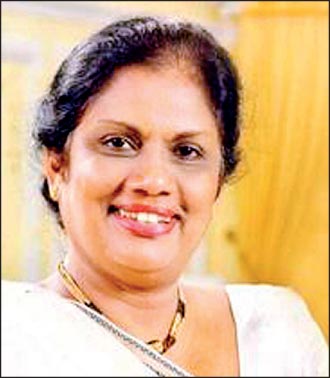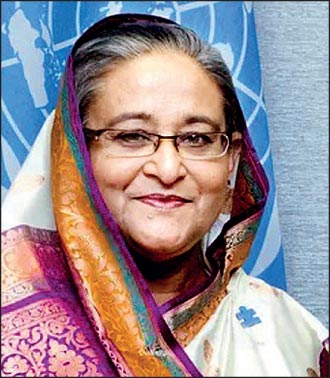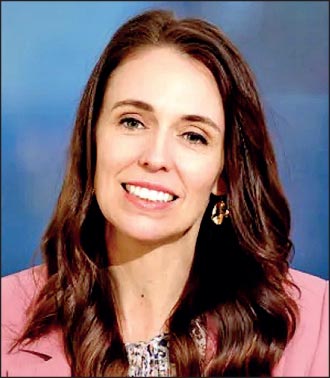Sunday Feb 22, 2026
Sunday Feb 22, 2026
Monday, 2 September 2024 00:00 - - {{hitsCtrl.values.hits}}

Sirima Bandaranaike

Chandrika Kumaratunga

Sheikh Hasina

Jacinda Ardern
|
By Rasanga Kumarihamy
In the 2024 Presidential election, there is a conspicuous absence of female candidates, marking a significant setback in the fight for gender equality in Sri Lankan politics. Despite the historical presence of influential female leaders in South Asia, the current political landscape in Sri Lanka is devoid of women contending for the highest office. This absence underscores the deep-seated challenges that continue to hinder women’s full participation in politics, including the enduring influence of patriarchal structures and the reliance on dynastic pathways for women’s political ascension.
Must men die or be assassinated for women to enter Sri Lankan politics?
In Sri Lanka, the emergence of women in political roles often follows the death or assassination of their male relatives. This trend is a significant aspect of Sri Lanka’s political history and is also seen across South Asia, where dynastic politics often enable female leaders to rise to prominence.
Sri Lanka made history in 1960 when Sirima Bandaranaike became the world’s first female prime minister following the assassination of her husband, S.W.R.D. Bandaranaike. Her daughter, Chandrika Kumaratunga, followed a similar path, stepping into politics after the assassination of her husband, Vijaya Kumaratunga. This pattern is reflected in the political careers of many other Sri Lankan women. Srimani Athulathmudali, Sudarshani Fernandopulle, and Vijayakala Maheswaran entered politics after their husbands’ assassinations.
Mallika Ratwatte, Renuka Herath, Daya Sepali Senadheera (who was assassinated by the Janatha Vimukthi Peramuna in 1988), Sumedha Jayasena, Ferial Ashraff, Rohini Kumari Wijeratne-Kaviratne, and Manjula Dissanayake also took up political roles following the demise of their husbands. Additionally, Keerthilatha Abeywickrama and Thalatha Atukorale entered politics after their brothers’ assassinations, while Sunethra Ranasinghe and Hirunika Premachandra followed their fathers’ assassinations. And there are more.
Regional comparisons
India’s political landscape has seen prominent female leaders like Indira Gandhi, who became Prime Minister following her father’s legacy, Jawaharlal Nehru. Her political career was significantly influenced by her father’s status and political groundwork. Indira Gandhi’s ascent to power set a precedent for women in Indian politics to often emerge from established political families. Another notable figure is Sonia Gandhi, who entered politics after her husband, Rajiv Gandhi, was assassinated in 1991. Sonia Gandhi’s leadership of the Indian National Congress has been pivotal, especially in revitalising the party and maintaining its influence in Indian politics.
Pakistan’s Benazir Bhutto’s political journey is another poignant example of dynastic politics. She became the first female leader of a Muslim-majority country after her father, Zulfikar Ali Bhutto, was executed. Benazir Bhutto’s tenure as Prime Minister was marked by significant political challenges, including issues related to corruption and governance. Despite these challenges, she remains a symbol of female political leadership in Pakistan. Her assassination in 2007 while campaigning underscored the ongoing volatility and risks faced by political figures in the country.
In Bangladesh, the political landscape has been shaped significantly by leaders like Sheikh Hasina and Khaleda Zia, who followed similar paths. Sheikh Hasina is the daughter of Sheikh Mujibur Rahman, the nation’s founding leader who was assassinated in 1975. Her leadership has been marked by efforts to stabilise the country’s economy and improve infrastructure despite numerous political challenges and threats. Khaleda Zia entered politics after the assassination of her husband, President Ziaur Rahman, and has served as Prime Minister in two non-consecutive terms. Both leaders have dominated Bangladeshi politics for decades, reflecting the country’s dynastic nature of political leadership.
The trend of women entering politics following the deaths of their male relatives highlights the patriarchal nature of South Asian societies, where men traditionally hold political power. This phenomenon raises critical questions about the barriers women face in politics. Despite these challenges, women like Aung San Suu Kyi in Myanmar and Megawati Sukarnoputri in Indonesia have carved out significant political careers.
Breaking the pattern: Encouraging independent women in politics
As the 2024 Presidential election approaches without a single female candidate, the absence serves as a stark reminder of the urgent need to dismantle the entrenched barriers that prevent women from achieving political power independently.
Breaking the pattern of political succession through familial connections and providing opportunities for independent women to enter politics in Sri Lanka is crucial for achieving true gender equality and diverse representation. When women ascend to political power solely due to their male relatives, it reinforces the notion that women can only succeed in politics through such connections, diminishing the efforts of countless capable women who could bring fresh perspectives and new leadership styles into the political arena if given the opportunity.
Encouraging independent women to enter politics would foster a more inclusive political environment and inspire future generations to pursue political careers on their own merits. It would also help dismantle the deep-rooted patriarchal structures that currently dominate South Asian politics. By promoting policies that support women’s education, leadership training, and equitable access to political opportunities, Sri Lanka can pave the way for a more representative and progressive political landscape.
To achieve this, comprehensive reforms are imperative. These reforms should focus on eliminating financial barriers by restructuring the political environment to prevent money from being the primary determinant of a candidate’s success. Implementing strict regulations on campaign financing, promoting transparency, and ensuring equal access to financial resources for all candidates, regardless of gender, will level the playing field and allow more women to enter politics based on their qualifications, not their financial backing. Creating a secure environment for women in politics is also crucial. This includes addressing and eradicating violence and intimidation faced by female politicians. Implementing specific legislation to protect women in politics and ensuring that political parties prioritise the safety of their female members will encourage more women to participate actively in the political process.
Furthermore, political parties should prioritise selecting candidates based on merit, integrity, and their ability to lead, rather than on financial contributions or familial connections. This shift will attract more capable leaders and reduce the influence of corruption within political systems.
Cultural and educational reforms are equally important in changing the entrenched patriarchal mindset that undermines women’s political capabilities. Introducing gender sensitisation in schools and public institutions, along with promoting leadership training and education for women, will prepare them for leadership roles and challenge stereotypes that suggest women lack the energy or capacity to be presidential candidates.
The world has witnessed numerous successful female leaders who have led their countries with distinction, often surpassing their male counterparts in effectiveness and governance. For instance, Angela Merkel, the former Chancellor of Germany, led her country through significant economic and political challenges, earning global respect for her leadership. Jacinda Ardern, the Prime Minister of New Zealand, is renowned for her empathetic and decisive leadership, particularly during crises such as the Christchurch mosque attacks and the COVID-19 pandemic. Ellen Johnson Sirleaf, the former President of Liberia, became Africa’s first elected female head of state and played a crucial role in stabilising the country after years of civil war. Tsai Ing-wen, the President of Taiwan, has been praised for her handling of cross-strait relations with China and her response to the COVID-19 pandemic, positioning Taiwan as a global leader in health and technology. These examples highlight that women are more than capable of leading their countries effectively, challenging outdated thinking patterns that underestimate women’s potential in politics.
As we look towards the future, perhaps with concerted effort and change, Sri Lanka will see independent women vying for the nation’s highest office, not as heirs to political dynasties but as leaders in their own right. By implementing these recommendations, countries like Sri Lanka and others in Asia can create a more equitable political landscape that truly represents the diversity and potential of all its citizens. This transformation is not just necessary but overdue, and it will pave the way for a more inclusive and progressive future.
References:
The Diplomat – How Have Women Leaders Shaped South Asia’s Politics?
EFSAS – Political Dynasty and Discrimination: The Female Leaders of South Asia
Disruptive Asia – Dynasties’ Daughters and Martyrs’ Widows: Female Leaders and Gender Inequality in Asia
Parliament of Sri Lanka – Lady List
Feminism in India – Barriers to Women’s Political Participation in South Asia: Money, Muscle & Misogyny
South Asia Journal – Empowering Women: Political Participation in South Asian Countries on International Women’s Day
(The writer is a Research Associate at Pathfinder Foundation.)